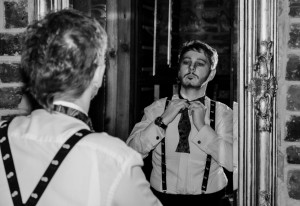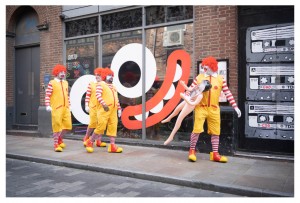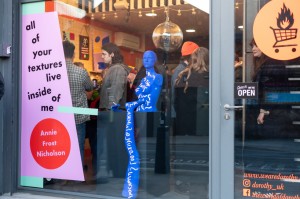“I feel passionate about getting diverse stories and voices out there.” The Big Interview: Matt Cain
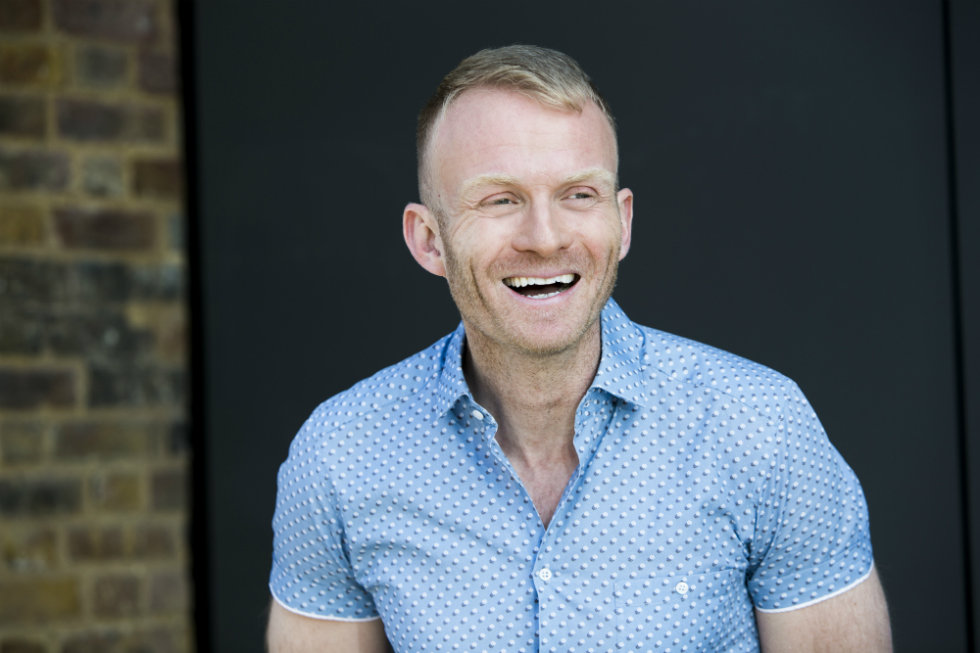
His latest novel The Madonna of Bolton was rejected more than 30 times by mainstream publishers for, among other things, being “too gay”. Author Matt Cain chats to Mike Pinnington about the book, the “old fashioned” publishing industry and, of course, the novel’s guiding force…
When Matt Cain started pitching an idea for a novel about Charlie, a boy growing up in the suburban north west of England, he was told it was “too working class, too Eighties, too immersed in pop culture, and too gay”. The novel would eventually be rejected more than 30 times before he took it to Unbound, the first crowdfunding publisher. The rest is history; The Madonna of Bolton became Unbound’s fastest funded book, and was released last year in hardback to critical acclaim. Subsequently, Cain was contacted by the curators of the Desire, Love, Identity; exploring LGBTQ histories exhibition, who asked him for memorabilia from his childhood to be included in the show at Bolton Museum. I spoke to Matt after the opening of the show.
The Double Negative: Hi Matt! First off, is your protagonist, Charlie you in all but name?
Matt Cain: He is me and he isn’t me. A lot of the specifics I changed. What I always say is, absolutely the emotional journey is mine, but some of the specifics I changed. For example, I wanted to look at how he felt like he was a failure as a man in his gender role. In real life, I have an older sister and a younger brother; my younger brother is very gender conforming. My fictional character has just an older brother, because I wanted to look at how he felt he didn’t measure up to him, so I thought it was better if this boy was older. I thought if I had a sister in the picture, it brings in too much extraneous information to explore.
Likewise, my mum and dad came from council estates and would identify as working class. But my dad went to a grammar school and was the first member of his family to go to university, and he became a teacher. So, arguably his children are either middle class, or in that transitional generation. I didn’t want to get into exploring class in this book, because there were other things I wanted to look at, so I basically made my character’s family much more transparently working class; I don’t know if those examples give you a sense of the fact that he is me and he isn’t me. When you get further into the narrative, there’s a lot of stuff that I did that I didn’t necessarily want to be out there for public consumption! Likewise, there’s some kind of wish fulfilment going on with the fictional version of yourself – or there certainly was in my case!
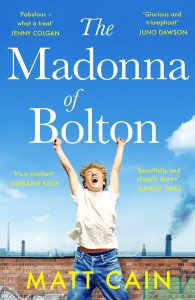
It’s incredibly relatable. Rooted in family and how people feel on the edges and get bullied at school.
You know, this book had 10 years of rejection by 30 publishers. One of the reasons I crowdfunded it was that I wanted to prove that wrong – thankfully that argument was won, and that’s great. But I kept getting all this feedback about it being too gay, and how straight readers who shop in Asda don’t wanna buy a book that has explicit sex in it, and all that. But at the same time, I would argue that yeah, if you take away the specifics of gay, Madonna, Bolton – I think I would argue there’s a lot of universal stuff in there, like not fitting in, feeling like a disappointment to parents, feeling like you have to get out of your home town in order to be yourself, yet later in life having a reconciliation with it. There’s plenty of reasons why someone might not fit in and cling on to an icon of popular culture like a spirit guide to get through a difficult teenage year, and a period, and plenty of forms that those challenges that people experience in those teenage years might take, so I’d like to think it is relatable, certainly that’s been the feedback so far.
Now it has been published, it’s been very well received. Does it feel like a great vindication for a book deemed “too working class” and “too gay”, or whatever?
The Mail on Sunday had a 100 summer reads for the beach and it was number one! It’s funny isn’t it! The gay thing was always the headline blockage with this book’s route to publication, but it’s only later in the process that I realised that, actually, the working class setting and protagonist and everything was also a major thing for the publishing industry. It’s so old fashioned; writers are predominantly people who can draw on independent wealth and, therefore, they’re often upper middle class. It’s really interesting when you get working class voices in the publishing industry – it’s still considered a radical thing. TV drama, for example, [has] Corrie, and theatre the kitchen sink drama. [But] it’s still radical in this day and age to have a working class voice. If you don’t believe me, The Bookseller recently did a survey looking at social class in publishing and the results were absolutely shocking. I think the setting and spirit of this book was also a barrier to publication, absolutely, but I’m proud of that getting through.
Was the writing of this book a protest and cathartic in allowing yourself to say “this is who I am and it will sell”?
Part of the reason you start off with fluffy nostalgic childhood stuff, is because I wanted to get some of the darker issues around gay life and experiences in by stealth, once people had already connected with the character and his story. And I kind of did spend a lot of time thinking about how to get them in by Trojan horse without putting off readers, but by the time it was published a few months ago, I think readers were much more ready to read about those issues than they may have been when I first started submitting it to publishers in about 2007-08. So, yeah, it wasn’t an angry protest, but I did want to prove a point. I suppose the point is – I feel passionate about getting diverse stories and voices out there, I think that’s really important. And when I used to make documentaries, that always informed my activity, so I did feel like I wanted to get this out there. It was all these publishers telling me that gay is not commercial. Gay would turn off mainstream audiences. This is after things like Will Young winning pop idol; after things like Brokeback Mountain had been a massive hit. I was still getting rejected for this book after Sam Smith had a number one album singing about being in love with a man – you’re not telling me everybody who bought that album was gay.
Can you talk a little bit about those rejections?
The fact it was rejected so much was fucking devastating to live with if I’m perfectly honest, and if I’d have known the struggle that it would be, and emotionally the toll that it would take on me, I don’t think I’d have put myself through it. But the whole thing gave the book a momentum that it wouldn’t have had if it had been picked up by a mainstream publisher and given a limited release. It got people riled and fired up about all the rejection it had had. One thing that’s been so gratifying about the publication is messages from readers, but people message me and say it’s really connected with them. There’s always been literary fiction about the gay experience [as opposed to the popular end of the scale].
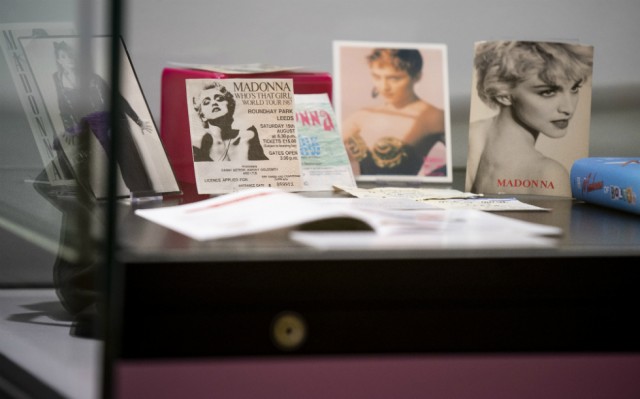
The term literary fiction can be so patronising. Is it a way of keeping people in their boxes in the world of publishing?
You get it in every art form. In music, there’s real music and commercial music; in publishing there’s literary and commercial – this split, y’know? [In film] there’s art house and multiplex. The truth is, there’s a lot of people who may want to watch a challenging art house film when they’re in the mood for that, and then when they’re in a different type of mood, may want to watch a Marvel superhero film, or a romantic comedy, and that’s very much how people consume. Or certainly people in my circle. That’s how I consume all the arts. I think it’s a really limiting idea to think that people are one or the other.
I read a lot of genre fiction [laughs], so consume quite a lot of science fiction.
Even you saying that, is slightly sheepish and laughing about it. It’s what people term a guilty pleasure – why the fuck should you feel any guilt about what you enjoy reading!? People in the arts have been conditioned to think there’s good, worthy art, or something you should feel embarrassed or ashamed of, and I just don’t get that at all. If somebody’s in to reading science fiction, what’s the problem with that?
I’m firmly in the camp of someone who consumes what I think of as popular culture, whatever that may be, as opposed to so-called hi, or low art.
You need a certain amount of intelligence and worldly wisdom to understand what makes popular culture special. There are certain people who just don’t have that capacity, and they will literally not be able to tell the difference between Madonna and what she’s done as an artist, and Little Mix now – actually, I quite like Little Mix, so maybe that’s a bad example! I vividly remember a publisher saying to me: “I don’t see the difference between Madonna and Dannii Minogue. Why wouldn’t you write this about Dannii Minogue?” I was just so stunned they couldn’t tell the difference. It’s so obvious, but to them it just wasn’t… I’m kind of not interested in those people. I think those icons and artists that tap into the spirit of the times, and drive it and move it somewhere else, I think that’s a really special thing, an amazing thing to be able to do. It’s so dismissive, so reductive to dismiss artists who work at the popular end of the spectrum.
There’s a world of culture that has been overlooked because it was produced by women, people of colour, the LGBTQ community.
I think it’s one of the greatest joys of reading that you can get into the head of a character from a completely different background to you, maybe a different gender, maybe a different ethnicity. As you said, what an enriching thing to experience life through their eyes, and how sad that so many of those voices were silenced at the time, and the art they wanted to communicate in whatever form wasn’t getting through.
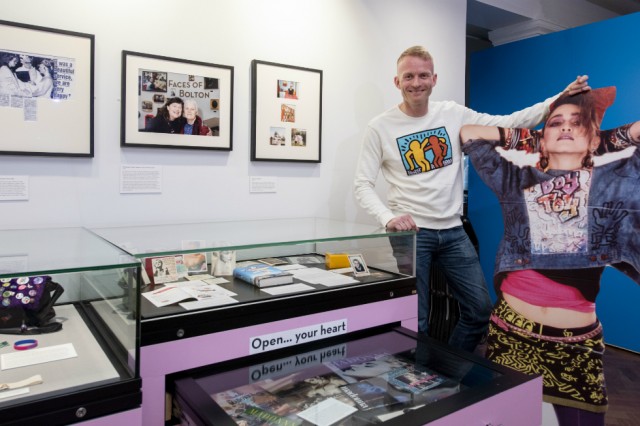
How was it going back to Bolton for the show, where they’ve used some of your childhood memorabilia?
It was great, actually. They got in touch with me ages ago, so this show Desire, Love, Identity, is on tour and Bolton museum got in touch last year to say they were doing this exhibition, and that they also wanted to add some local stories into the mix. I was massively flattered, honoured, excited. It really had an impact on me being there [for the opening] actually, I did get really moved. Family came, and I was standing there reading from the book in front of this display, and it was one of those wow moments, thinking, what would my nine year old self think? I would literally never have imagined when I was nine, and being savaged for being different and creative and gay – I would never have imagined that one day I would be coming back to Bolton being celebrated because I’d written a book inspired by that dark period in my life which would go on to being my greatest achievement and greatest source of happiness. For that to be celebrated and commemorated in the museum of my home town, it was really kind of humbling.
Were you prepared for the feelings and memories?
It’s difficult really. I always thought I had to get out, and I didn’t fit in. It was only later in life that other factors drew me back, but also I started to realise that everywhere in Britain was shit for creative geeky gays in the 1980s – I just didn’t have much concept of what was going on anywhere else, because you know there was no internet or anything, and distances seemed really great. Bolton’s only 22 minutes from Manchester Piccadilly on the train and you’re right next to the gay village when you arrive, but that felt like another world away in those days, I had no idea it was even going on.
Finally, let’s talk about Madonna – what was it about her that meant her name informs and graces your book?
I used to watch Madonna tours and videos; [she] was all about self-empowerment, and being sexually expressive. She was very pro-gay, very keen on celebrating her gay creative collaborators, friends and family right from the start, so I kind of dreamed about this vague Madonna world. I knew she was from America, obviously. But she’d had to get out of where she was brought up in America in Michigan, to go to New York to follow her dream, so I just had this idea that – I didn’t really know – I just knew I had to get out. I have a favourite record which is Open Your Heart, from 1986, because that’s when I think she really found her voice as an artist. If you look at the video, she’s playing a stripper performing on the outskirts of society in this seedy club, and in the audience you’ve got all these misfits and outsiders, including a lesbian drag king and a pair of gay sailors arm-in-arm.
This is the height of the AIDS crisis, and the hysteria that generated, and the hatred that generated towards gay men… So, she’s setting herself up quite explicitly as an ally to anyone who’s ostracised on the fringes of society because of their sexual identity. One of the most autobiographical chapters in the book is when [Charlie] goes to see Madonna’s first UK live gig, 1987’s Who’s That Girl tour, and I went at the age of 12, and that was the first song that she performed; so I had this unhappy life thinking I was cut off from the world, then suddenly Madonna appears in front of me singing this song, all about channelling your own inner strength and determination, following your dream and being true to yourself. You know, get out there, you can have it, and it completely blew me away.
Mike Pinnington
The Madonna of Bolton by Matt Cain is available in paperback from Unbound from 16 May; Desire, Love, Identity; exploring LGBTQ histories in Bolton is at Bolton Museum until 26 May
Images from top: Matt Cain; The Madonna of Bolton; displays and Matt Cain at Bolton Museum



